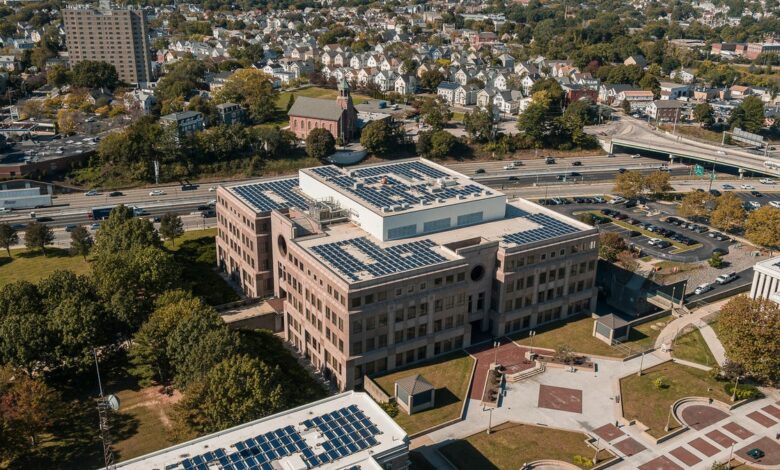Best Solar Panel Installation Companies in Rhode Island




For such a small state, Rhode Island has big plans for renewable energy — and big ways to save on your power bill by installing rooftop solar panels. Rhode Island has an ambitious goal of supplying 100% of the state’s electricity from renewable sources by 2033. This is a big undertaking due to the state’s reliance on natural gas, which fueled 87% of its electricity generation in 2021, according to the US Energy Information Administration.
“The interconnection queue here in Rhode Island is very high,” Shauna Beland, the administrator of renewable energy programs with Rhode Island’s Office of Energy Resources, told CNET. “We have quite a few projects in the queue not only for residential projects, but also for some of the larger-scale projects. So we’re on track to meet that 2033 goal.”
In order to reach its 100% renewable electricity goal, Rhode Island’s government is encouraging an expansion of solar energy by providing a variety of solar incentives for homeowners which already accounts for the majority of its clean energy portfolio. In addition to the 30% rebate on clean energy additions on your home from the federal tax credit, Rhode Islanders can take advantage of net metering policies and sales and property tax exemptions for solar panel systems.
With the help of those state solar incentives and the state’s big push for clean energy, the solar switch in Rhode Island may be less costly for you. Here’s what you need to know if you’re considering getting panels for your home, starting with the best solar installation companies operating within the state.
Best national solar panel companies in Rhode Island
There are relatively few options for installers in Rhode Island compared to other states. Getting several solar quotes from different installers can help you find the best price possible for your system.
“We recommend that customers get at least three to four quotes before they decide on a solar installer,” Beland said.
Take customer reviews, warranties, installer fees and maintenance fees into account as well when choosing your solar installer. Here are a few solar companies to consider in Rhode Island.

Palmetto Solar
Best overall
Solar panels are typically low maintenance equipment, but they’re also unfamiliar. If you want to reap the benefits of solar but will have a bit more peace of mind if someone else is making sure it’s working, Palmetto might be a good fit for you. Just remember to add the cost of Palmetto’s monitoring service in to your payback period calculations.

Freedom Forever
Best for cash customers
Include Freedom Forever in your search if you want the backing of a national company that installs a wide variety of the most popular solar equipment available. Freedom Forever also extends a couple of products that take some of the pain and risk out of going solar, like a production guarantee and an escrow option with cash purchases. Online reviews say customer satisfaction has been low of late, though the company says that’s changing.

Tesla Solar
Most affordable
Tesla’s solar branch seems to be the least loved of Elon Musk’s ventures. Even Tesla’s Solar Roof seems to get more love.
If price is the thing you won’t budge on, consider Tesla. By all accounts, Tesla installs quality panels and makes the closest thing there is to a household name in solar storage: the Powerwall.
Where you might miss out is customer service. Discussion online seems to suggest Tesla’s service is a bit of a gamble.
Local solar panel companies in Rhode Island
Experts say you should get multiple quotes before moving ahead with a company. Local companies might offer more competitive pricing, as their sales overhead might be lower.
Green Power Energy is headquartered in New Jersey and has been installing solar since 2009. The company mainly operates in northeastern states and installs solar panels, home batteries and electric vehicle chargers. Green Power Energy offers a 25-year workmanship warranty, with specific solar panels and inverters coming with a 25-year product and performance warranty. You can buy your solar panels with cash, a solar loan or sign up for a solar lease.
Founded in 1994, Trinity Solar is a solar company currently operating in nine states along the east coast. Trinity Solar installs solar panels, solar batteries and inverters. Solar panel purchases come with a five-year workmanship warranty and inverters come with a 12-year warranty, which can be extended if desired. You can pay for your system with cash, a solar lease or a power purchase agreement. Note that Trinity Solar’s leases and power purchase agreements are fully covered by a warranty for the duration of the agreement.
How to determine which Rhode Island solar company is the best for me
Experts recommend you get multiple quotes from multiple companies before making a purchase. Once you’ve got quotes in hand, you can weed through them using a few criteria. Price will almost always be a consideration, as will how you feel about your interactions with the company so far.
You should rely on the experience of others, too. Ask friends and neighbors who have gone solar about their experience with their chosen installer. You can also look up the company with the Better Business Bureau and read the complaints and reviews other customers have left.
You should also learn about red flags that might mean a solar salesperson is overpromising or being dishonest.
Why are electricity prices so high in Rhode Island?
Rhode Island consumes the second lowest amount of energy per capita in the US but pays the fourth highest electricity rate in the country at 27.50 cents per kilowatt-hour. That leads to an average monthly electricity bill of $160.88, according to CNET’s sister publication SaveOnEnergy.
So why is electricity so expensive? Blame natural gas, which saw prices spike in 2022 after Russia invaded Ukraine.
“Most of our electricity generation comes from natural gas,” Beland said. “We’re one of the most highly dependent states on natural gas.”
Read more: Just looking for an emergency backup? Check out best folding solar panels and solar generators.
Cost of solar panels in Rhode Island
Here’s a look at the average cash price for a typical solar panel system in Rhode Island before factoring in tax credits and incentives, according to data from FindEnergy.com.
Average cost of solar panels in Rhode Island
| Typical system size (kW) | Price per watt | Total installed cost | Cost after 30% federal tax credit | |
| Rhode Island | 5 | $4.07 | $20,350 | $14,245 |
| National average | 8.6 | $3.67 | $31,558 | $22,091 |
We’ve put together an interactive map that displays the average total cash price, cost per watt and system size for a typical solar panel system in your state, according to data from FindEnergy.com. These prices you’ll see don’t reflect rebates from tax credits or state incentives. Certain states don’t have any FindEnergy solar data and are grayed out on the map.
Rhode Island solar panel incentives and rebates
The Ocean State offers a wide variety of state solar incentives and programs. These programs can help make going solar more affordable and accessible to Rhode Island residents.
Along with state solar incentives, Rhode Islanders can also take advantage of the federal residential clean energy credit, which allows you to claim 30% of the total cost of your solar system in tax credits. The state has a net metering policy as well, allowing you to sell your excess solar energy back to the grid.
“With net metering, customers are eligible for the Renewable Energy Fund Grant, which is currently, for 2023, 65 cents per watt, with a cap of $5,000,” Beland said. “The way the program works is that the selected solar installer applies to the Renewable Energy Fund on the customer’s behalf and the installer is required to pass through the incentive to help reduce the total upfront cost of the system.”
It’s also worth noting that solar panels are viewed as a home improvement. Installing solar panels can increase the value of your home by about $15,000, according to the US Department of Energy.
Here are a few noteworthy Rhode Island solar incentives. A complete list of incentives can be found on the Database of State for Renewables & Efficiency. More information on state specific solar incentives can also be found in Rhode Island’s Office of Energy Resources residential solar guide.
Rhode Island solar incentives
| Incentive | Program description |
|---|---|
| Net metering | Rhode Island net metering law allows you to sell your excess solar energy back to the grid in exchange for credits. You can apply those credits to electricity bills to reduce or eliminate what you owe. |
| Property tax exemption | You won’t see any increases to your property taxes when you install solar panels in Rhode Island. |
| Residential clean energy credit | The residential clean energy credit is a federal tax credit offering solar owners 30% of the total cost of their solar system back in tax credits. |
| Renewable Energy Growth Program | REG is a solar incentive program, administered by the utility company National Grid, offering solar owners bill credits for energy based on the state’s Performance-Based Incentives system. The REG program is different from the state net metering policy, and you can’t participate in both at the same time. |
| Renewable Energy Fund | REF is a grant program provided by Rhode Island Commerce Corporation to support the upfront cost of a net metered renewable energy system. This program can’t be paired with the REG program offered by Rhode Island Energy. |
| Rhode Island sales tax exemption for renewable energy | All solar equipment purchases are exempt from the Rhode Island sales tax. The exemption will automatically be applied at the point of purchase. |
How solar-friendly is your state?
CNET recently ranked states based on their residential solar policies: the laws and regulations affecting consumer-level solar panel installation and adoption. These policies play a major role in determining how accessible and affordable a solar panel system is to the average resident.
Each state was evaluated through a methodology and scored based on eight categories. The final score was converted to a letter grade.
Here’s how your state scored on CNET’s solar policy test.
Rhode Island
Grade: B
Incentives available:
- Per-watt generation grant up to $5,000 with the Renewable Energy Fund
- State-governed net metering at fraction of retail rate net
- Solar panel systems fully exempt from property taxes
- Solar panel systems fully exempt from sales tax
- Statewide low-income rooftop solar and community solar programs
Strongest scoring categories:
The energy generation grant (up to $5,000) can save residents a chunk of change on their solar panels.
Categories to improve:
While Rhode Island has statewide net metering, it isn’t offered at the retail rate, which means you’re losing out on precious credits that could help you pull electricity from the grid for free when your solar panels aren’t producing enough to power all of your appliances.
How to pay for solar panels in Rhode Island
Residential solar panels are an expensive investment no matter where you live. If you’re serious about going solar, take some time to work out all your options and find the best payment method for your needs. Here are a few of the most common ways to pay for your solar panels.
Cash: If it’s in your budget, paying for your solar panels upfront with cash is your best payment option. You won’t have to worry about high financing fees or interest rates, and your eligibility for tax incentives and rebates won’t be at risk. If you have plans to go solar in the future, consider putting some money into a high-yield savings account, which will help you generate more money over time.
Solar loan: Solar providers usually offer financing options for solar panels, often referred to as a solar loan. These loans are typically overseen by a third party, so carefully inspect any associated fees and interest rates.
Other loans: If cash isn’t an option, you have other financing possibilities beyond a solar loan. Taking out a personal loan with your bank or opening a home equity line of credit are a couple other options. However, if you do choose to go with a HELOC, it’s important to be aware of the risks. If you can’t pay back what you owe, your home could face foreclosure.
Lease or power purchase agreement: If you aren’t interested in owning your own solar panels, you can sign a solar lease or enter a power purchase agreement. A solar lease means paying for the use of a company-owned solar system. Entering a power purchase agreement means you’ll pay for the electricity generated by a company-owned solar system at a fixed rate. This rate is typically lower than the retail rate provided by the local utility company. Ask your solar provider which options are available for you.
Installation factors to consider
Other than your budget, here are a few installation factors to keep top of mind as you determine if your home is right for solar:
Condition of your roof: Is your roof suitable for solar? Your roof needs to be in good condition before solar installation. Roof damage, age, pitch and tree cover may affect the productivity of your solar panels. Solar panels have the best efficiency performance on south-facing roofs angled between 15 and 40 degrees, according to the US Department of Energy. Reputable solar installers will perform a roof inspection before installing solar panels.
Insurance coverage: Does your homeowner’s insurance agency cover rooftop solar panels? Check with your agency to see if you can add your solar panels to your insurance policy.
Location: How much sunshine will your solar panels get? The longer the sun is at its peak, the better your solar panels will perform. Rhode Island is one of the cloudier states in the US, ranking 35th out of 50 for state sunlight ranking. With an average of 4.23 hours of peak sunlight per day, according to TurbineGenerator, Rhode Island falls a bit short on sunshine.
Solar easements: Does your home have guaranteed access to sunlight? Rhode Island allows property owners to establish solar easements — your right to direct sunlight for your solar system. Your solar easement must be in writing and include a description of the property involved, a description of the angles and three-dimensional space involved, the terms of easement termination and provisions for compensation of the property owner.
Financing options: Can you afford solar? If you can’t pay upfront, there are plenty of other options available to you. Solar loans, personal loans, solar leases and power purchase agreements are just a few options to consider. Solar is a big investment, so do your research and find your best payment option beforehand.
How we evaluate solar companies
The companies we listed above as “the best” are curated from CNET’s best solar companies list. Companies making the best list are scored on the equipment, warranties and customer service they offer. Then, we make sure these recommendations are available in your state. You can read a full breakdown of how we review solar companies here.
Companies listed under the local installers were chosen in a less rigorous way. We chose them because they offered something unique or notable to customers in the state, they seemed well-regarded by internet reviewers or because they were one of the few installers we could find information on in the state.
Whether we’ve completed a full review on a company or not, it’s always a good idea to get multiple quotes from different installers before choosing a company.
Rhode Island solar power FAQs
Does Rhode Island offer state solar incentives?
Rhode Island is a pro solar state, offering a variety of state solar incentives and a net metering policy. There are also federal solar incentives for homeowners to take advantage of.
Is going solar in Rhode Island worth it?
The short answer: it depends. Rhode Island has many solar incentives and some of the highest electricity rates in the country, making solar look a bit more attractive for its residents. However, solar panels are a huge investment, and not every home may be right for solar. Before deciding to go solar you should take into account your household’s energy usage, the condition of your roof, tree coverage, insurance and the cost of solar panels.
How long do solar panels last?
The average lifespan of a solar panel is between 15 to 30 years. Solar installers will often offer a warranty on their solar panels. A competitive solar warranty will cover a solar panel for up to 25 years. Factors that will affect the lifespan of your solar panels are weather, panel quality and maintenance.
CNET’s Katherine Watt contributed to this article.




